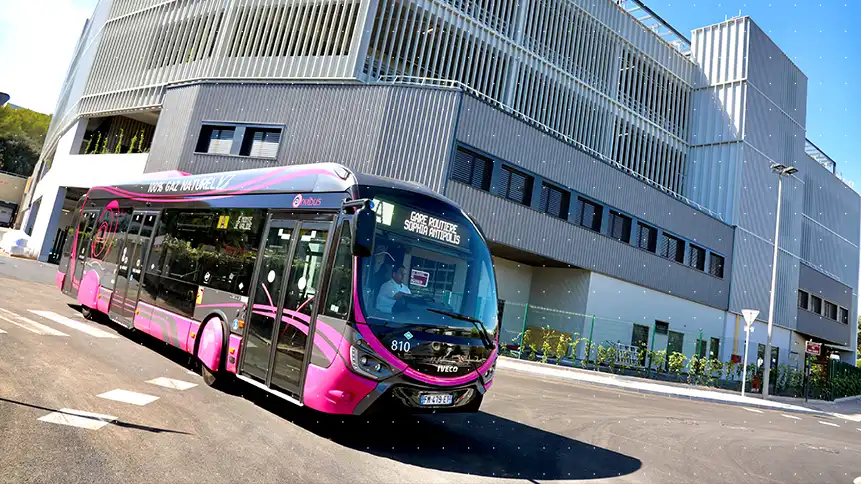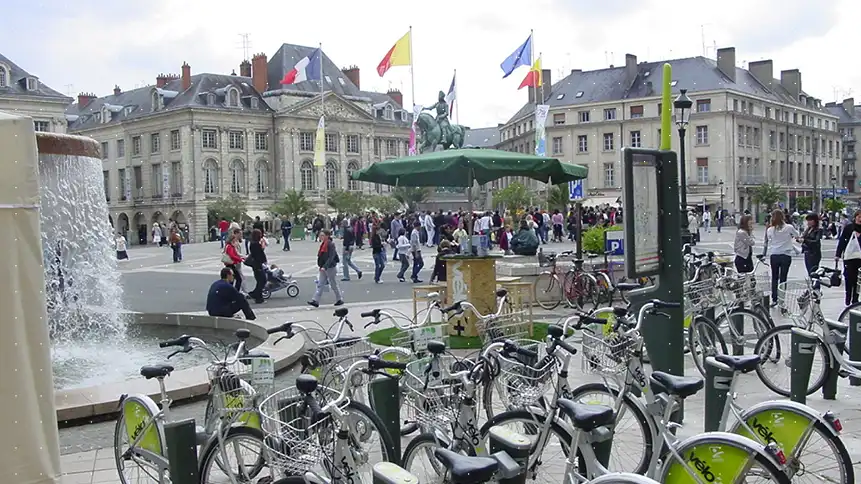In response to the climate emergency, Keolis is firmly committed to acting alongside public transport authorities and its partners. Our greenhouse gas reduction targets are in line with the 2015 Paris Agreement. They aim to limit global warming to 1.5°C above pre-industrial levels by the end of the century. The Science Based Targets initiative (SBTi) has confirmed that Keolis' contribution to the fight against climate change is consistent with its climate transition plan. This contribution is based on ambitious and concrete actions:
Main commitments
- 42%reduction in emissions related to energy consumption by 2030
- 43%of Group purchasing volumes expressed in emissions will be sourced from SBTi-engaged suppliers by 2028
- 25%reduction in greenhouse gas emissions by 2030 for Upstream energy, waste management, and commuting
A policy focusing on environmental performance
Keolis’ public service mission fits naturally into the UN Sustainable Development Goal 11: by reducing the role of personal cars, the Group works to promote sustainable cities and communities.
The Group’s environment policy comprises three key undertakings:
Contribute to climate change mitigation through its practices and promoting sustainable mobility
Protect the environment by controlling its activities and preventing pollution
Continuously improve its environmental approach.
"For more than ten years, Keolis has been committed to accelerating the ecological transition, in all the countries where we are present, to reduce the impact of mobility on the environment."
Antonia Höög, Director of CSR and Engagement, Keolis
Acting for the ecological transition
Improving waste recovery
Keolis subsidiaries are also continuing their efforts to improve the recovery rate of their waste, with sorting, recovery or elimination guidelines tailored to the local context (applicable legal regulations). In 2023, 83% of hazardous waste was recovered, a 10-point increase over two years.
Controlling energy and water consumption
Conscious of their impact on water resources, Keolis subsidiaries adopt consumption reduction measures such as vehicle washing water recycling and rainwater harvesting. These efforts led to a 9% drop in water consumption between 2022 and 2023.
In Antibes, France, the local subsidiary has gone one step further by building the first above-ground car park to incorporate all the criteria of the "Bâtiments Durables Méditerranéens" label: solar panels, low-carbon concrete floors, recycled wood partitions and rainwater recovery.
With regard to energy consumption, each Keolis subsidiary has drawn up its own energy efficiency plan.

Prioritising renewable electricity
In 2023, Keolis reiterated its commitment to the environment by signing renewable power purchase agreements with French solar power specialist Urbasolar. From 1 January 2025, the Group will benefit from a secure supply of renewable electricity for its operations. Generated in solar farms in France, this green electricity will avoid 290 tonnes of CO2 emissions every year for 15 years, the equivalent of driving 3.4 million kilometres. A major step forward for Keolis towards ever more sustainable mobility.
A holistic and certified approach
60% of Keolis' turnover is covered by ISO 14001 certification, the most widely recognised environmental management system in the world. This certification testifies to the holistic approach and commitment of all its employees to reducing the environmental impact of activities. The goal for 2030 is to have 80% of the Group’s turnover covered by ISO 14001 certification.

Moving towards more sustainable mobility
The Group assists public transport authorities in improving the environmental performance of their transport networks. It encourages multimodality, shared mobility and active mobility (carpooling, cycling, etc.). In consultation with the communities concerned, the Group constantly seeks the most appropriate local mobility solutions to meet their local environmental, social and economic challenges.
On the road to hydrogen mobility
Keolis supports the development of low-carbon and sustainable urban mobility. The Group is trialling the operation of fleets of hydrogen-powered vehicles in France and the United States. In September 2024 it began operating and maintaining 14 new and retrofitted hydrogen-powered buses on two main lines of the Clermont-Ferrand Métropole T2C public transport network. These 14 vehicles come on top of the 33 hydrogen-powered New Flyer buses already operating on the Foothill network in Southern California.

